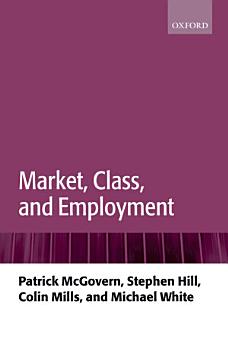Market, Class, and Employment
دسمبر 2007 · OUP Oxford
ای بک
344
صفحات
family_home
اہل ہے
info
reportدرجہ بندیوں اور جائزوں کی تصدیق نہیں کی جاتی ہے مزید جانیں
اس ای بک کے بارے میں
Much of the received wisdom about the world of work emphasizes the marketization of the employment relationship; the decline of class-based forms of inequality, and the individualization of employment relations. Non-standard forms of employment, the delayering of organizational hierarchies, and the use of individual performance-based payment systems are all held up as examples of a new neo-liberal order in which employers and employees no longer feel a sense of obligation to each other. Drawing on a range of employee and employer surveys, including the authors own Working in Britain 2000 survey, this ambitious study presents a comprehensive examination of the conditions, attitudes, and experiences of British employees from the mid-1980s to the early years of this century. The authors' analyses provides a compelling critique of the received wisdom, while also providing an original, alternative account of recent developments in work and labour markets. Along the way, the book covers such topical issues as the changing nature of trade union membership, the consequences of Britain's 'long hours' culture', and the apparent inability of women to ask for pay rises. Significantly, the authors seek to reposition debates about the future of work by restoring the concepts of contracts and social class to the analysis of the employment relationship. Based on the ESRC funded Future of Work research programme this book is destined to shape our understanding of employment in Britain for the foreseeable future.
مصنف کے بارے میں
Patrick McGovern is Senior Lecturer in Sociology at the London School of Economics & Political Science having previously held positions at Aston University and London Business School. His research interests are in economic sociology, especially the sociology of work and labour markets, and international migration. He is the author of HRM, Technical Workers and the Multinational Corporation (Routledge, 1998). Stephen Hill is the Principal of Royal Holloway, University of London and Professor of Management. He has written widely on social theory and economic sociology. His research interests include work and organizations, control systems, quality management, human resource management and the effects of technological change on manufacturing organizations. He is the author or co-author of six books including Competition and Control at Work (Heinemann, 1981), The Dominant Ideology Thesis (Allen & Unwin, 1980), Dominant Ideologies (Unwin Hyman, 1990) and the Penguin Dictionary of Sociology (Penguin, 2006). Colin Mills is University Lecturer in Sociology and Fellow of Nuffield College, University of Oxford. His research interests are in social stratification, the sociology of employment relations and measurement issues in the social sciences. He previously held appointments at the University of Surrey and the London School of Economics. Michael White founded the Employment Studies Group at the Policy Studies Institute, University of Westminster, where he is now Emeritus Fellow. He is author of Against Unemployment (PSI, 1991) and co-author of Restructuring the Employment Relationship (OUP, 1998) and Managing to Change? - British workplaces and the future of work (Palgrave, 2004). He was awarded an OBE for services to labour market policy in 2005.
اس ای بک کی درجہ بندی کریں
ہمیں اپنی رائے سے نوازیں۔
پڑھنے کی معلومات
اسمارٹ فونز اور ٹیب لیٹس
Android اور iPad/iPhone.کیلئے Google Play کتابیں ایپ انسٹال کریں۔ یہ خودکار طور پر آپ کے اکاؤنٹ سے سینک ہو جاتی ہے اور آپ جہاں کہیں بھی ہوں آپ کو آن لائن یا آف لائن پڑھنے دیتی ہے۔
لیپ ٹاپس اور کمپیوٹرز
آپ اپنے کمپیوٹر کے ویب براؤزر کا استعمال کر کے Google Play پر خریدی گئی آڈیو بکس سن سکتے ہیں۔
ای ریڈرز اور دیگر آلات
Kobo ای ریڈرز جیسے ای-انک آلات پر پڑھنے کے لیے، آپ کو ایک فائل ڈاؤن لوڈ کرنے اور اسے اپنے آلے پر منتقل کرنے کی ضرورت ہوگی۔ فائلز تعاون یافتہ ای ریڈرز کو منتقل کرنے کے لیے تفصیلی ہیلپ سینٹر کی ہدایات کی پیروی کریں۔





